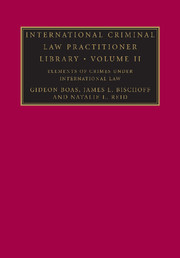Book contents
2 - Crimes against humanity
Published online by Cambridge University Press: 10 December 2009
Summary
A crime against humanity is one of several specific offences – such as murder, extermination, deportation, or rape – committed as part of a widespread or systematic attack on a civilian population, and at least one of the relevant actors involved n the commission of the crime must know that the offence forms part of such an attack. It is these circumstances and knowledge which elevate an otherwise ‘ordinary’ offence to the level of an international crime. This category of crimes, first enunciated by the post-Second World War tribunals, but having roots in treaties and state practice from earlier in the twentieth century, is distinguished from war crimes by three principal characteristics: the context in which the crime occurs, which under customary international law need not be during or connected to armed conflict; the scale of the criminal conduct, which cannot be isolated but must necessarily form part of a broader attack; and who may be considered a victim of the crime – according to most authorities, only civilians. Unlike other international crimes, the elements and application of crimes against humanity have evolved in aconvoluted and confusing manner, rendering their definition complex and at times difficult to understand.
These complexities derive from the delicate legal birth of this crime in the work of the International Military Tribunal at Nuremberg (IMT), and its less-than-uniform development thereafter.
- Type
- Chapter
- Information
- International Criminal Law Practitioner Library , pp. 14 - 137Publisher: Cambridge University PressPrint publication year: 2009



